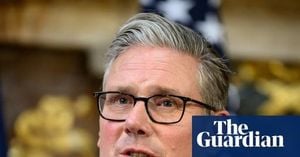On July 22, 2025, a significant diplomatic engagement took place in Tokyo, marking a milestone in the relationship between Japan and the Independent State of Papua New Guinea. Prime Minister Shigeru Ishiba of Japan warmly welcomed Papua New Guinea's Prime Minister James Marape at the Prime Minister's Office for a summit meeting that underscored the deepening ties between the two nations. This visit coincided with the 50th anniversary of Papua New Guinea's independence and the establishment of diplomatic relations between the two countries, a fact that both leaders acknowledged as a foundation for future cooperation.
Prime Minister Marape traveled to Japan not only to participate in the summit but also to represent Papua New Guinea at the National Day Ceremony of the Osaka-Kansai Expo, a prestigious event highlighting international collaboration and cultural exchange. The visit was marked by a reception hosted by the Papua New Guinea Ambassador to Japan, which was attended by State Minister for Foreign Affairs Hisayuki Fujii. In his remarks, Fujii expressed Japan's appreciation for the longstanding cooperation between the two nations and emphasized Japan's determination to strengthen the "tomodachi" or friendly relationship, involving both public and private sectors, as they commemorate this half-century of diplomatic engagement.
Prime Minister Marape reflected on the significance of this golden jubilee, stating that Japan has been one of Papua New Guinea's most important partners over the past fifty years. He expressed his commitment to further promote friendly relations and deepen collaboration across various fields. This sentiment was echoed throughout the meetings and discussions held during the visit, highlighting a shared vision for enhanced bilateral ties.
One of the key outcomes of the summit was Japan's pledge to provide free defense equipment to Papua New Guinea under its official security assistance program. Prime Minister Ishiba conveyed Japan's intent to "flesh out cooperation" with Papua New Guinea, signaling a strategic partnership aimed at regional stability. Ishiba also emphasized Japan's commitment to working closely with Papua New Guinea to realize a free and open Indo-Pacific region, a goal that aligns with broader international efforts to maintain peace and security in the area.
In addition to the political and security dimensions, economic and social development featured prominently in the discussions. On the same day, JICA President Tanaka Akihiko met with Prime Minister Marape in Tokyo to reaffirm Japan's support for Papua New Guinea's development initiatives. Tanaka congratulated Papua New Guinea on its 50th anniversary of independence and reviewed the outcomes of the 10th Pacific Islands Leaders Meeting (PALM10) held in Tokyo the previous year. He underscored JICA's commitment to collaborate closely with Papua New Guinea, aiming to further strengthen bilateral relations.
Prime Minister Marape expressed his gratitude for JICA's ongoing cooperation, highlighting symbolic projects such as the Nadzab-Tomodachi International Airport, which stand as tangible examples of the partnership's success. Both leaders exchanged views on expanding future cooperation, particularly in critical sectors like education and health, which are essential for Papua New Guinea's continued economic and social progress.
The multifaceted nature of the Japan-Papua New Guinea relationship was evident throughout the visit. From high-level political dialogues to development cooperation and cultural exchange, the two countries demonstrated a shared commitment to building a robust and enduring partnership. The celebrations of the 50th anniversary of independence and diplomatic relations provided a timely backdrop to reflect on past achievements and set ambitious goals for the future.
State Minister Fujii's remarks at the reception captured the spirit of the occasion, welcoming Prime Minister Marape's visit and appreciating the extensive cooperation that has flourished over the years. He stated that Japan is determined to work even harder to strengthen the "tomodachi" relationship, signaling a comprehensive approach that involves governmental agencies, private enterprises, and civil society in both countries.
Prime Minister Ishiba's pledge of defense aid represents a new chapter in security cooperation, reflecting Japan's strategic interest in supporting Papua New Guinea as a key partner in the Indo-Pacific. This move aligns with Japan's broader foreign policy objectives and its commitment to regional security frameworks. The provision of free defense equipment is expected to enhance Papua New Guinea's capabilities and contribute to maintaining a stable and open regional order.
Meanwhile, JICA's role in advancing development projects continues to be pivotal. The organization's focus on infrastructure, education, and health reflects an understanding of Papua New Guinea's priorities and challenges. The Nadzab-Tomodachi International Airport project, in particular, symbolizes the tangible benefits of this partnership, improving connectivity and fostering economic growth.
The visit also reinforced the importance of multilateral engagement, as evidenced by references to the Pacific Islands Leaders Meeting (PALM10). Such forums provide opportunities for dialogue and cooperation among Pacific nations and their partners, promoting shared development goals and regional stability.
Overall, the summit and related events on July 22, 2025, showcased Japan and Papua New Guinea's dedication to nurturing a multifaceted partnership that spans diplomacy, security, development, and cultural ties. As both nations look ahead, the foundation laid over the past fifty years offers a strong platform for advancing mutual interests and contributing to peace and prosperity in the Indo-Pacific region.




